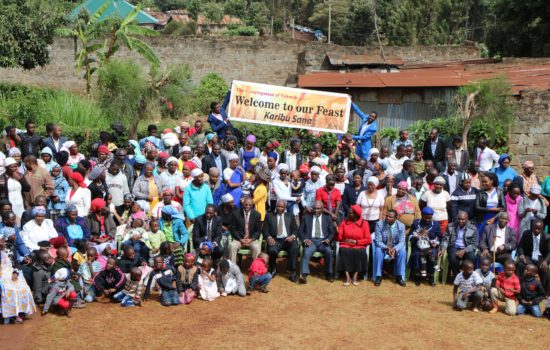Lesson: THE FEASTS OF YAHWEH
Introduction:
There are many holidays celebrated by the Bible readers worldwide and are claimed to be taken from the Bible. The Bible itself says nothing about such festivals as Christmas, Easter, Good Friday, Halloween, Valentine and others.
Yahweh has his own days of celebrations known as feasts and are well recorded in the Bible. His people, Israel, have observed these days for many centuries. Yahshua and the church of the New Testament celebrated them too. In this lesson “The Feasts of Yahweh” we are going to learn about each of these feasts, their appointed times and their significance. The lesson covers the following:
- The Purpose of the Feasts of Yahweh
- Who commands the observance of these feast and whose are they?
- What are the feasts commanded by Yahweh? Their list.
Let us keenly seek to understand these feasts purposely given by Yahweh to his children both to observe and to reap the blessings given to those who observe them.
- The Purpose of these Feasts:
- For Gatherings – The feasts were the times people gathered together for holy convocations – (Lev. 23:2 and 4).
- They Worshipped – People giving offerings and sacrifices to Yahweh at the place He had chosen for the occasions (Deut.16: 5,6,11, 13-16).
- For Celebrations – These are times they rejoiced before Yahweh with the orphans, the windows and the needy ones in their community. Normally feasts were at harvest times when food was plenty and people had money to enable them to travel and have something to help others with. They were forbidden to appear before Yahweh empty handed (Deut.16:16; Exod. 23:14, 15).
- For Teaching – These were the times people gathered to be taught Yahweh’s Law that governed their lives and conduct (Neh. 8:2-3, 7-8, 18; Deut.31:9-13).
- Who commanded the observance of the feasts and whose feasts are they?
“ And Yahweh spake unto Moses, saying, 2 Speak unto the children of Israel, and say unto them, Concerning the feasts of Yahweh, which ye shall proclaim to be holy convocations, even these are my feasts (Lev. 23:1, 2, KJV).
Exodus 23:14 Three times thou shalt keep a feast unto me in the year ( See Exod. 23:14-17; 34:18, 22-23).
Many who hear about the feasts being mentioned relate them to the Jews and argue that they are not to be observed by everybody. The Scriptures clearly say that these are Yahweh’s feasts. The Jews and the Gentiles are both commanded by Yahweh to keep them. If they do not obey they disobey Yahweh who gave the Command.
- The Feasts Listed: Leviticus 23:1-44
- The Seventh Day Sabbath:
The Seventh Day Sabbath is a weekly convocation that Yahweh has given to his people both as one among the Ten Commandments and as an appointment among the feast days list. It is one of his feasts that people will hold a sacred assembly. Leviticus 23:3: Isaiah 58:13-14, 66:23.
- Feast of Unleavened Bread
This celebration starts with the eating of the “Passover on Abib 15th night and continued for a period of 7 days. There is no Feast of Unleavened Bread without the Passover lamb slaughtered. “In the fourteenth day of the first month at even (between two evenings) is Yahweh’s Passover” (Lev. 23:5). Passover was celebrated by slaughtering the lamb and eating it with unleavened bread and bitter herbs in the night of Abib 15, the very night Yahweh delivered his people, Israel, from Egypt. The blood of the lamb in Egypt was sprinkled on the door posts of the Israelite houses and the angel of destruction “passed over” their houses when he killed the Egyptian firstborns (Exod. 2:1-14, 29 – 37).
Yahshua died at the same time when the Passover lambs were killed in Israel to redeem us from the bondage of sin (1 Cor. 5:8). “In him we have redemption through his blood. The forgiveness of sin in accordance with the riches of Yahweh’s grace” (Eph.1:7).
On the bib 15, the Feast of Unleavened Bread started and was celebrated seven days. In that period Israelites were commanded not to eat any leaven or even have it in their houses. On the first day and the last day they were to hold a sacred assembly. These two days were holy days when no work was permitted to be done except preparing food (Lev. 23:6-8, Exod. 12:16). Yah
- The First fruits
Leviticus 23:9-11. This ordinance concerned a sheaf that was to be waved by the Priest on the Sunday that falls within the feast of Unleavened bread. It was offered by the Israelites immediately they entered into Canaan for them to be allowed to eat the harvest of the land. This was not a day of a holy convocation. However, this day is very important because this is the day one starts to count towards Pentecost. It is in the days of unleavened bread.
- Feast of Weeks (Pentecost) – Leviticus 23:15-16
From the day that the Priest waved the sheaf in the feast of Unleavened bread, 7 Sabbaths were to be complete and on the 50th day a sacred assembly was to be held in regard to this feast. It is called Pentecost in Greek as found in Acts 2:1 – the day the Holy Spirit descended. It is 50 days from the day the sheaf was waved before Yahweh.
- Feast of Trumpets – Leviticus 23:23-25
The feast of trumpets comes on the first day of the seventh month and is a time when Israelites shouted before Yahweh with the blowing of shofar (rams horn). It was a day of rest when no work was to be done but Yahweh’s people were to hold a sacred assembly.
- Feast of Atonement – Leviticus 23:26-32
This day was very solemn among the Israelites when the High Priest was to enter the holy of holies and offer the atoning blood before the mercy seat for the forgiveness of sins. It occurred on the 10th day of the 7th month when all Israelites were to fast before Yahweh and hold a sacred assembly.
- Feast of Tabernacles – Leviticus 23:33-36, 39-43
This is the last feast of Yahweh each year. It starts on the 25th day of the7th month and ends on the 22nd day of the same month. This is an eight day feast. The first and the last days are holy convocations and no work is allowed to be done.
NOTE: All commandments, including the Sabbath, were given to Israel because at that time they were the only people of Yahweh. The other people were without Yahweh and were shut out of the commonwealth of Israel. But through Yahshua, we who were far away have been brought near into the family of Yahweh (Eph. 2:12, 13). This is why Paul says we are no longer aliens or foreigners. We are fellow citizens with the people of Yahweh, the Israelites (Eph. 2:19). The book of Isaiah also tells us those who join Yahweh and keep His covenant and commandments will be accepted in His house of prayer.
6 “And foreigners who bind themselves to YAHWEH to serve him, to love the name of YAHWEH, and to worship him, all who keep the Sabbath without desecrating it and who hold fast to my covenant— 7 these I will bring to my holy mountain and give them joy in my house of prayer. Their burnt offerings and sacrifices will be accepted on my altar; for my house will be called a house of prayer for all nations.” 8 The Sovereign YAHWEH declares–he who gathers the exiles of Israel: “I will gather still others to them besides those already gathered” (Isa. 56:6-8 NIV). The choice is ours. Shall we choose to walk like Yahweh’s people or like the Gentiles?
Jeremiah also tells us more about this; “And it shall come to pass, if they will diligently learn the ways of my people, to swear by my name, Yahweh liveth; as they taught my people to swear by Baal; then shall they be built in the midst of my people” (Jer. 12:16). The Gentiles will have to know the ways Yahweh gave His people Israel and observe them diligently if they want to be part of Yahweh’s people.
Paul tells us; “17 And if some of the branches be broken off, and thou, being a wild olive tree, were graffed in among them, and with them partakest of the root and fatness of the olive tree; 18 Boast not against the branches. But if thou boast, thou bearest not the root, but the root thee” (Rom. 11:17, 18 KJV). We Gentiles are compared to branches of a WILD OLIVE TREE. We are now partaking of the good olive tree and grafted in among the Israelites. Shall we bring the wild things into this tree? We are supposed to be like the natural branches of the good olive tree for we partake of this olive’s root or stem.
This means we have to learn the ways of the old people of Yahweh for us to be truly in their midst as one with them. For that purpose, we need to learn how to keep the feasts of Yahweh and keep them as He commanded. Otherwise, we shall be serving another god and not Yahweh.
When we come before Yahweh in His holy convocations, we shall rejoice before Him (Deut. 16:11, 14), worship Him and praise Him in songs and dance. Our sacrifices will be what comes from our mouths (Heb. 13:15, 16). David says 15 “O Lord, open my lips, and my mouth will declare your praise. 16 You do not delight in sacrifice, or I would bring it; you do not take pleasure in burnt offerings. 17 The sacrifices of Elohim are a broken spirit; a broken and contrite heart, O Elohim, you will not despise” (Psalm 51:15-17). These are the types of sacrifices we shall offer to Yahweh including offering of bodies, as holy sacrifices to Him (Rom. 12:1)
Conclusion:
The above are the feasts of Yahweh that occur annually and which Yahweh commanded His people to observe. Yahweh intended that all mankind obey and observe all His feasts. We therefore deprive ourselves the blessings that Yahweh promised those who observe them if we fail to honour them. Yahweh changes not. What he promised to Israel over their observance still stands today on those who do them.

